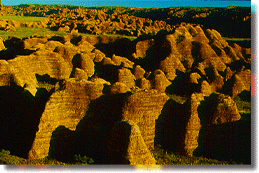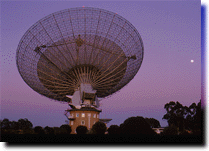 Australia is a land of scenic contrasts:
golden beaches, coral reefs rich with aquatic life, tropical rainforests,
snowy mountains, open pasture fields and sparse deserts.
Australia is a land of scenic contrasts:
golden beaches, coral reefs rich with aquatic life, tropical rainforests,
snowy mountains, open pasture fields and sparse deserts.

 Australia is a land of scenic contrasts:
golden beaches, coral reefs rich with aquatic life, tropical rainforests,
snowy mountains, open pasture fields and sparse deserts.
Australia is a land of scenic contrasts:
golden beaches, coral reefs rich with aquatic life, tropical rainforests,
snowy mountains, open pasture fields and sparse deserts.
One of the oldest continents, Australiais the sixth largest country in area after Russia, Canada, China, the United States and Brazil. Australia is as wide as the distance from Kuala Lumpur to Taipei and as long as the distance from Singapore to Manila. It is the only country to occupy an entire continent.
Situated between, and isolated by, the Indian and Pacific Oceans,
Australia has many animals and plants which are unique to the planet. The
surface geology is typically old and flat.
![]()
 Nearly a third of Australia is in the
tropics and the rest is in the temperate zone. The highlands and tablelands
of Tasmania and the south eastern corner of the mainland are the coldest
areas. Average yearly temperature varies from 27oC at Cape York in the
far north to 13oC in the far southern areas of Tasmania. Summer is from
December to February; autumn from March to May; winter from June to August;
and spring from September to November.
Nearly a third of Australia is in the
tropics and the rest is in the temperate zone. The highlands and tablelands
of Tasmania and the south eastern corner of the mainland are the coldest
areas. Average yearly temperature varies from 27oC at Cape York in the
far north to 13oC in the far southern areas of Tasmania. Summer is from
December to February; autumn from March to May; winter from June to August;
and spring from September to November.
Sites showing human occupation have accepted dates of 40 000 years. Recent work in north west Australia identified rock art that may be 175 000 years old.
European settlers arrived in the late 18th century. On 26 January 1788 the first fleet reached Port Jackson and established a settlement in what is now Sydney.
Settlements were established in: Hobart, Tasmania (1803); Brisbane,
Queensland (1824); Perth, Western Australia (1829); Melbourne, Victoria
(1835); and Adelaide, South Australia (1836). The Colonies federated in
1901.
![]()
The British influence going back to Australia's colonial origins has
given way to multiculturalism. Almost a quarter of today's 18 million Australians
were born in another country. About 2 per cent are of Aboriginal and Torres
Strait Islander descent. More than 100 different ethnic groups are represented
in Australia, enriching the culture and making Australia one of the most
ethnically diversified countries in the world. For example, Melbourne is
the second largest Greek city in the world; Athens is the largest. The
main source for immigrants to Australia is now Hong Kong.
![]()
English is the official language. However, a recent government survey
in South Australia revealed that SA's university students speak a total
of more than 85 languages. Almost a quarter of them were born overseas,
and one in five uses a language other than English at home.
![]()
Australia has six States: New South Wales, Victoria, Queensland, South Australia, Western Australia and Tasmania - and two mainland Territories - the Australian Capital Territory and the Northern Territory.
Elected by the people of Australia, the Commonwealth Government governs Australia, although, as a constitutional monarchy, HM The Queen Elizabeth II of the United Kingdom is the formal head of state. The Queen is represented in Australia by a governor-general. The Parliament is based on the Westminster system. Common law is the basis of Australia's legal system.
There are three levels of government: the Commonwealth Government led by the Prime Minister, the State Governments led by Premiers and local governments run by councillors.
Australia is a democracy and debate is a component of the Australian
political process. People debate politics and controversial issues without
fear of reprisal. For instance, when fees for international students were
introduced Australian students protested. They were concerned that Australian
students may have to pay full fees. They were not protesting against the
arrival of international students.
![]()
Australia is a Christian country however all religions are represented
in the community. Devotees will find churches, mosques, temples and synagogues
located in most major cities. While Australians are not strongly attached
to religious belief or observance they are tolerant of other people's religious
beliefs.
![]()
Australians' attitudes are less formal that most other countries particularly
in the Asia Pacific region. International students may find this off putting
initially. For students accustomed to a ritualistic society with clearly
identified levels of status and authority they find they need a little
time to adjust to Australia's less structured culture.
![]()
 Apart from its natural assets like
the Great Barrier Reef, Australia also is rich in the arts. There are eight
professional orchestras and a national opera company. Within Australia
there are more than 1000 museums preserving and displaying Australia's
diverse cultural heritage. Australians enjoy concerts, theatre and art
exhibitions.
Apart from its natural assets like
the Great Barrier Reef, Australia also is rich in the arts. There are eight
professional orchestras and a national opera company. Within Australia
there are more than 1000 museums preserving and displaying Australia's
diverse cultural heritage. Australians enjoy concerts, theatre and art
exhibitions.
Australian films are winning international acclaim. Australian
authors have received international recognition particularly with the Booker
prize, won twice by Australians.
![]()
Australians are very keen on sport and outdoor activities. Australia
has more than 120 national sporting organisations and thousands of state,
regional and club bodies. It is estimated that
6.5 million people, about a third of the population, are registered
sports participants. While there are over 120 sporting organisations, Australians
also take part in bushwalking, fishing, boating and water sports.
Australia has a world wide reputation for sports and outdoor activities.
This is endorsed by the Olympic Committee's selection of Sydney to host
the Olympic Games in the year 2000.
![]()
 Australia's contribution to scientific
and technological developments is significant. Australian scientists have
led the way in major scientific research from medicine to computer technology.
Australia's contribution to scientific
and technological developments is significant. Australian scientists have
led the way in major scientific research from medicine to computer technology.
The Commonwealth Scientific and Industrial Research Organisation is
Australia's main scientific research body. It assists Australia's rural,
manufacturing, communications, minerals and energy and construction industries.
Other major government scientific research bodies include the Australian
Nuclear Science and Technology Organisation, the Australian Institute of
Marine Science and the Defence Science and Technology Organisation.
![]()
For many years, Australia has received worldwide recognition for its expertise in the fields of science, mathematics and the arts. Australia has produced seven Nobel Laureates:
Living in Aus | Specific
Details
Listed of Universities | Studying
in Aus